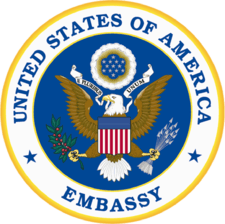Embassy of the United States, Caracas
| Embassy of the United States in Caracas Embajada de los Estados Unidos en Caracas  | |
|---|---|
 | |
| Location | Distrito Federal Caracas, Venezuela |
| Chargé d'affaires | Lee McClenny |
| Website |
caracas |
The Embassy of the United States in Caracas is a United States embassy that represents the United States in Caracas, Venezuela. The embassy provides assistance to American citizens and residents who live in Venezuela and issues visas to foreign nationals, who are Venezuelan and legal residents in Venezuela, who wish to visit or immigrate to the United States.
The United States has not had an ambassador to Venezuela since July 2010 when Patrick Duddy finished his assignment. Lee McClenny has been the Chargé d’Affaires of the Embassy of the United States in Caracas since July 2014.
History
Bolivarian government
Hugo Chávez
During the presidencies of Hugo Chávez and Nicolás Maduro, relations between Venezuela and the United States deteriorated. On 11 September 2008, Ambassador Patrick Duddy left Venezuela after Chávez claimed that he was involved in an American-led initiative to remove him from office.[1] Duddy eventually returned to his position in July 2009[2] but after his assignment ended in July 2010, Chávez refused a replacement for the ambassador.[3]
Nicolás Maduro
On 2 March 2015, President Maduro accused the United States of plotting a coup against him and demanded that the Embassy of the United States in Caracas reduced its staff from over 200 workers to 17 individuals within two weeks.[4][5] With about 232,500 applications made through the embassy in 2014, this created fears that difficulties would arise for the demand of visas by Venezuelans.[4] Despite Maduro's orders, the staff did not change at the embassy.[5]
Works
Organized through the embassy, classes teaching the English language are offered at Bi-National Centers in the cities of Caracas, Maracaibo, and Mérida.[6] Poor high school students in Venezuela are also taught English language classes and United States culture through the English Access Microscholarship Program while the Youth Ambassadors Program sends Venezuelan students in high school for three weeks of studies.[6] The International Visitor Leadership Program allows Venezuelan professionals to visit the United States to observe their American counterparts.[6] Due to the approval of the United States by Venezuelans, demand and popularity for such programs are very high and competitive.[6]
The visa system of the embassy works by accepting payments and applications made in advance online.[4] Appointments are then made after applying online, with individuals required to arrive early and wait in line to make sure they fit into their designated appointments.[4] Visa and United States residency applications have increased in recent years.[4]
References
- ↑ Romero, Simon (September 12, 2008). "Alleging Coup Plot, Chávez Ousts U.S. Envoy". The New York Times. Retrieved 2009-02-08.
- ↑ "U.S. ambassador back in Venezuela". UPI. Retrieved 2009-07-03.
- ↑ "Without ambassadors, US-Venezuela tensions grow". AP. Retrieved 2011-01-01.
- 1 2 3 4 5 "Maduro Reprisal Could Clog US Visa Process in Venezuela". Reuters. 4 March 2015. Retrieved 2015-10-30.
- 1 2 Lee, Brianna (12 May 2015). "US Top Diplomat Returns To Venezuela To Smooth Bilateral Ties". International Business Times. Retrieved 2015-10-30.
- 1 2 3 4 Wisemen, Geoffrey (2015). Isolate or Engage: Adversarial States, US Foreign Policy, and Public Diplomacy. Redwood City, CA: Stanford University Press. pp. 259–277. ISBN 978-0804793889.